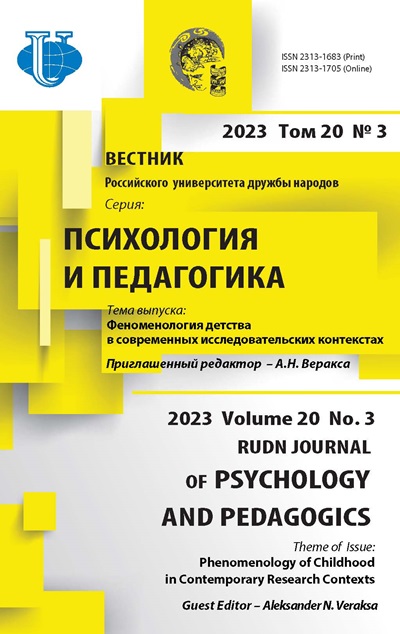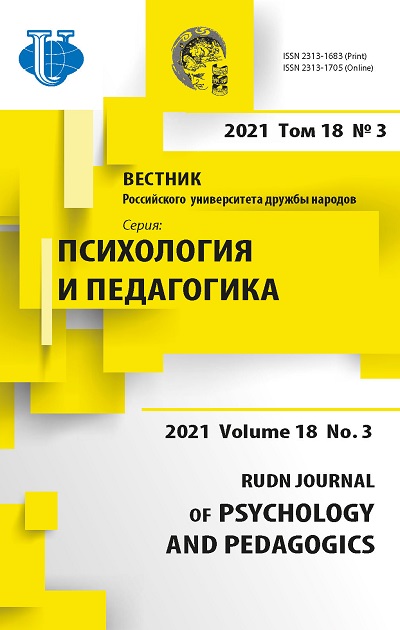Focus Groups as a Questionnaire Pretest for Surveys in Cross-Cultural and Cross-National Comparative Research
- Authors: Grigoryev D.S.1
-
Affiliations:
- National Research University Higher School of Economics
- Issue: Vol 18, No 3 (2021)
- Pages: 475-488
- Section: PERSONALITY AND INTERPERSONAL RELATIONSHIPS IN THE INTERCULTURAL DIMENSION: METHODOLOGY OF PSYCHOLOGICAL RESEARCH
- URL: https://journals.rudn.ru/psychology-pedagogics/article/view/27591
- DOI: https://doi.org/10.22363/2313-1683-2021-18-3-475-488
Cite item
Full Text
Abstract
As a research method, focus groups have methodological advantages for understanding the views and behavior of group members or for understanding the social system as a whole, since it covers the interaction between people, groups, and the interpersonal environment quite well that widely recognized in the social sciences. These advantages are introduced in the context of mixed-methods, including conducting a survey together with focus groups as a pretest questionnaire in a comparative perspective in cross-national and cross-culture research. Focus groups provide to reach construct equivalence and elaborate an appropriate context-oriented language for questionnaire questions. Using the focus groups in this way can be an effective approach to overcoming the initial limited ability of surveys to valid measure more complex socially constructed concepts, the meaning of which can vary significantly from one group to another, especially from a comparative perspective in cross-national and cross-culture research. Using focus groups, data is collected in a more “natural” way, that is, more close to the real world, while the generalization is ensured by a detailed description of specific conditions, participants, and research environment. In addition, the discussion group is a miniature thinking society, and unlike dyadic interviews or surveys, focus group discussions give participants the opportunity to express their opinions, discuss their views and opinions with other participants, listen to other people’s opinions, disagree or to develop thoughts by reasoning out loud - this is similar to what happens in real life. This increased awareness about the described advantages of the approach for cross-cultural and cross-national comparative research likely contributes to its more active employ.
About the authors
Dmitry Sergeevich Grigoryev
National Research University Higher School of Economics
Author for correspondence.
Email: dgrigoryev@hse.ru
ORCID iD: 0000-0003-4511-7942
PhD, is Research Fellow, Center for Sociocultural Research
20 Myasnitskaya St, Moscow, 101000, Russian FederationReferences
- Albrecht, T.L., Johnson, G.M., & Walther, J.B. (1993). Understanding communication processes in focus group. In D. Morgan (Ed.), Successful Focus Groups: Advancing the State of the Art (pp. 51–64). Newbury Park, CA: Sage.
- Ayrton, R. (2019). The micro-dynamics of power and performance in focus groups: An example from discussions on national identity with the South Sudanese diaspora in the UK. Qualitative Research, 19(3), 323–339. https://doi.org/10.1177/1468794118757102
- Belanovskiy, S.A. (2001). Metod fokus-grupp. Moscow: Nikkolo-Media Publ. (In Russ.)
- Benítez, I., van de Vijver, F., & Padilla, J.L. (in press). A mixed methods approach to the analysis of bias in cross-cultural studies. Sociological Methods & Research. https://doi.org/10.1177/0049124119852390
- Berry, J.W. (2019). Ecocultural psychology (D. Grigoryev, Transl.). Кul'turno-Istoricheskaya Psikhologiya, 15(4), 4–16. (In Russ.) https://doi.org/10.17759/chp.2019150401
- Berry, J.W., Poortinga, Y.H., Breugelmans, S.M., Chasiotis, A., & Sam, D.L. (2011). Cross-cultural psychology: research and applications. 3rd ed. Cambridge: Cambridge University Press. https://doi.org/10.1017/CBO9780511974274
- Braun, V., & Clarke, V. (2006). Using thematic analysis in psychology. Qualitative Research in Psychology, 3(2), 77–101. https://doi.org/10.1191/1478088706qp063oa
- Chekhovskiy, I.V. (2009). O znachimosti oshibok, voznikayushchikh pri ispol'zovanii metoda fokus-grupp (po rezul'tatam poiskovogo issledovaniya). RUDN Journal of Sociology, (2), 83–92. (In Russ.)
- Chekhovskiy, I.V. (2017). Metod fokus-grupp: Faktory effektivnogo ispol'zovaniya. Moscow: RUDN University. (In Russ.)
- Davidov, E., Schmidt, P., & Billiet, J. (Eds.). (2011). Cross-cultural analysis: Methods and applications. New York, NY: Routledge, Taylor & Francis Group.
- Dmitrieva, E.V. (1999). Metod fokus-grupp: Problemy podgotovki, provedeniya, analiza. Sotsiologicheskie Issledovaniya, (8), 133–138. (In Russ.)
- Fowler, S., & Willis, G.B. (2019). The practice of cognitive interviewing through web probing. In Advances in Questionnaire Design, Development, Evaluation and Testing (pp. 451–469). Hoboken, NJ: Wiley. https://doi.org/10.1002/9781119263685.ch18
- Glenton, C., & Carlsen, B. (2019). When “normal” becomes normative: A case study of researchers’ quotation errors when referring to a focus group sample size study. International Journal of Qualitative Methods, 18, 1–6. https://doi.org/10.1177/1609406919841251
- Hennink, M.M. (2017). Cross-cultural focus group discussions. In R. Barbour, D. Morgan (Eds), A New Era in Focus Group Research (pp. 59–82). London: Palgrave Macmillan. https://doi.org/10.1057/978-1-137-58614-8_4
- Inglehart, R., & Welzel, C. (2003). Political culture and democracy: Analyzing cross-level linkages. Comparative Politics, 36(1), 61–79. https://doi.org/10.2307/4150160
- Jack, R.E., Crivelli, C., & Wheatley, T. (2018). Data-driven methods to diversify knowledge of human psychology. Trends in Cognitive Sciences, 22(1), 1–5. https://doi.org/10.1016/j.tics.2017.10.002
- Jung, H., & Ro, E. (2019). Validating common experiences through focus group interaction. Journal of Pragmatics, 143, 169–184. https://doi.org/10.1016/j.pragma.2019.02.019
- Kruger, L.J., Rodgers, R.F., Long, S.J., & Lowy, A.S. (2019). Individual interviews or focus groups? Interview format and women’s self-disclosure. International Journal of Social Research Methodology, 22(3), 245–255. https://doi.org/10.1080/13645579.2018.1518857
- Lauri, M.A. (2019). WASP (Write a Scientific Paper): Collecting qualitative data using focus groups. Early Human Development, 133, 65–68. https://doi.org/10.1016/j.earlhumdev.2019.03.015
- Matsumoto, D., & van de Vijver, F. (Eds.). (2011). Cross-cultural research methods in psychology. Cambridge: Cambridge University Press. https://doi.org/10.1017/CBO9780511779381
- Melnikova, O.T. (2007). Fokus-gruppy: Metody, metodologiya, moderirovanie. Moscow: Aspekt Press Publ. (In Russ.)
- Morgan, D.L. (1996). Focus groups. Annual Review of Sociology, 22(1), 129–152. https://doi.org/10.1146/annurev.soc.22.1.129
- Munafò, M.R., Nosek, B.A., Bishop, D.V.M., Button, K.S., Chambers, C.D., Percie du Sert, N., … & Ioannidis, J.P.A. (2017). A manifesto for reproducible science. Nature Human Behaviour, 1(21), 1–9. https://doi.org/10.1038/s41562-016-0021
- Nosek, B.A., Ebersole, C.R., DeHaven, A.C., & Mellor, D.T. (2018). The preregistration revolution. Proceedings of the National Academy of Sciences, 115(11), 2600–2606. https://doi.org/10.1073/pnas.1708274114
- Novikova, I.A., Novikov, A.L., Gridunova, M.V., & Zamaldinova, G.N. (2017). Intercultural competence profiles in Russian university students. RUDN Journal of Psychology and Pedagogics, 14(3), 326–338. https://doi.org/10.22363/2313-1683-2017-14-3-326-338
- Tashakkori, A., & Teddlie, C. (2008). Quality of inferences in mixed methods research: Calling for an integrative framework. In M.M. Bergman (Ed.), Advances in Mixed Methods Research: Theories and Applications (pp. 101–119). Thousand Oaks, CA: Sage.
- Tatarova, G.G., & Chekhovskiy, I.V. (2012). Focus groups: Expert assessments of “fail factors”. Sotsiologiya: Metodologiya, Metody, Matematicheskoe Modelirovanie (4M), (34), 5–31. (In Russ.)
- Van de Vijver, F. (2018). Towards an integrated framework of bias in noncognitive assessment in international large-scale studies: Challenges and prospects. Educational Measurement: Issues and Practice, 37(4), 49–56. https://doi.org/10.1111/emip.12227
- Van de Vijver, F., & Leung, K. (1997). Methods and data analysis for cross-cultural research. Thousand Oaks, CA: Sage.
- Van de Vijver, F., Chasiotis, A., & Breugelmans, S.M. (Eds.). (2011). Fundamental Questions in Cross-Cultural Psychology. Cambridge: Cambridge University Press. https://doi.org/10.1017/cbo9780511974090
- Welzel, C., & Inglehart, R.F. (2016). Misconceptions of measurement equivalence: Time for a paradigm shift. Comparative Political Studies, 49(8), 1068–1094. https://doi.org/10.1177/0010414016628275
- Willis, G.B. (2004). Cognitive interviewing: A tool for improving questionnaire design. Thousand Oaks, CA: Sage.
















